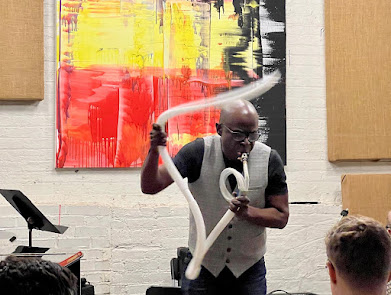My struggles with confidence has been a constant companion throughout my life's journey, with and without my horn. I certainly have my good days and bad days, as we all do. Interestingly, my feelings towards those who effortlessly radiate interpersonal confidence have been a mix of admiration and annoyance. Though I admire their unbridled swagger, I’m more annoyed that I don’t always have that within me. But delving into the intricacies of my off-the-bandstand insecurities isn't the focus here; rather, I aim to delve into the realm of music, although the two often intertwine, which is a blog post to itself.
We often seek to attain musical confidence through the pursuit of musical perfection, or at least something close to it. Achieving rhythmic precision, mastering harmonic fluency, and wielding instrumental prowess can create an illusion of confidence without question. Yet, these attributes often seem to merely scratch the surface.
In my own musical experience, this approach has proven ineffective. Trust me, when I say that I've burned enough midnight oil to light up a small town. Anyone who has ever toured with me during my youth, or had the misfortune of being my roommate, can certainly attest to this. But contrary to what you think would have been the end result, instead of making a genuine connection with the audience, my playing would come across as rigid and lacking in emotional communication when fixated on these technical benchmarks. After the gig, I'd often be told that I needed to loosen up a bit—an image that's now hard to envision. Just check out the picture above. Today, people probably wish that I’d reign it in a bit, even though I imagine they secretly like being taken into unfamiliar sonic areas. It’s human nature.
As a player, I’m flawed with the best of them. But unlike the twenty-something version of myself, I know longer lose sleep over my musical hurdles. I’ve learned that trying to develop the power and agility to jump over them is not my only option. I can either walk around them, or as I prefer, create a new path. The irony of walking your own path, is that putting one foot in front of the other is the easy part. Giving yourself permission to do so, is when we find ourselves bound and shackled.
But genuine confidence as I see it, emanates from authenticity, not just proficiency. I've found solace in embracing my true self, or at least the creative version of it. Let me just add that authenticity is not just who you say you are, but who you always are. This mode of expression speaks volumes louder than conforming to a rigid template of excellence often endorsed in jazz studies programs. I am unapologetically inclined towards atypical approaches, a fact that defines my artistic persona—definitely in the last ten years or so. This path is replete with both advantages and obstacles, yet ultimately, it's uniquely mine.
When I embarked on my journey with the soprano, I was frequently likened to Steve Lacy and Wayne Shorter. It’s rare that a CD reviewer or audience member even mentions them even in passing. Thanks God, those two never hung out at Home Depot. Or else, I'd just be another clone. Today, I proudly claim my own space, for better or worse, laden with both praise and jest. It's evident that not everyone is going to enthusiastically pack their bags and join you on all of your creative explorations--especially when you stray from the pack. And even if they all wanted to come along, there’s probably not enough room.
Wrapping up, I just want to reiterate that confidence is most eloquently displayed through the unwavering embrace of one's true self. Confidence is not simply about projecting an inflated chest, but baring one's heart.
Interested in reading more of my thoughts on music, click below.









